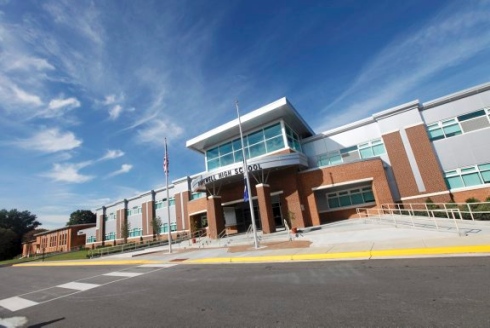Richmond Center aiding school's turnaround

For more than a year, a school system in Hopewell, Va., has been working with experts from the Virginia Tech Richmond Center to find ways to improve test scores and raise on-time graduation rates.
Thirty-seven schools across the commonwealth are being required to develop improvement plans after failing to meet annual state benchmarks aimed at reducing proficiency gaps between low-performing and high-performing schools.
Carol Cash, an assistant professor in Virginia Tech’s School of Education, leads the three-year school improvement grant with Hopewell High School. “We sat down with the school and asked, ‘What is it you’re looking for and how can we help?’ as opposed to saying, ‘Let us come in and turn around your school,’ ” she says. “You don’t turn around a school with an outsider; you turn around a school with the people inside the school.”
Virginia Tech has provided professional development and coaching for administrators, plus discipline and classroom management strategies for teachers, Cash says.
“We want to help the school leaders become a more effective team so that when the grant is over, the progress they’ve made can be sustained,” she says.
At a retreat this summer at The Hotel Roanoke & Conference Center, Cash enlisted Ted Price, an assistant professor in the School of Education, to help a group of Hopewell teachers and administrators build better leadership skills.“We want them to come away communicating better as a team, not just as individuals,” Price says.
Melissa Lubin, director of the Richmond Center, taught leadership and communications skills to the group along with Price. She says such a program is a natural extension of the work done at the center.
“At the Richmond and Hampton Roads centers, we offer graduate degrees in education leadership, so we have expertise in these areas,” Lubin says. “We’re used to working closely with school systems and with teams within schools on professional development and continuing education. This grant has allowed us to go deeper into an institution and work with an intact team in a specific school.”
“The experts from Virginia Tech are teaching us team-building activities and helping us understand each other’s strengths and weaknesses so we can better complement each other and enhance what we’re already doing,” Principal Rodney L. Berry said. “They’re helping to show us what we can do to get better at our craft.”
Dedicated to its motto, Ut Prosim (That I May Serve), Virginia Tech takes a hands-on, engaging approach to education, preparing scholars to be leaders in their fields and communities. As the commonwealth’s most comprehensive university and its leading research institution, Virginia Tech offers 240 undergraduate and graduate degree programs to more than 31,000 students and manages a research portfolio of $513 million. The university fulfills its land-grant mission of transforming knowledge to practice through technological leadership and by fueling economic growth and job creation locally, regionally, and across Virginia.




